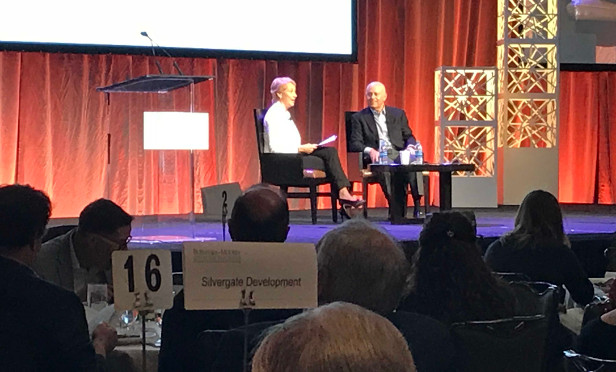
SAN DIEGO—It helps to have a local concentration while building a global platform, Prologis's chairman and CEO Hamid Moghadam told Barbara Cambon, policy advisory board member of the Burnham-Moores Center for Real Estate at the University of San Diego School of Business. Cambon held a fireside-chat-style interview with Moghadam during the BMC's 22nd Annual Real Estate Conference here Thursday.
At Cambon's request, Moghadam gave a brief summary of his 35-year history with the company that has become Prologis, from working just to “keep the lights on” to building a firm that now has between $75 billion and $80 billion in assets. He spoke of creating AMB as an independent public company focused on industrial and proposing a merger to Prologis in 2010, which was the largest M&A deal in CRE history, he said.
Moghadam also described how his firm is different from other REITs in that it is very global—in 19 countries on four continents, including countries such as Japan, China, Singapore, Brazil and Mexico. “We're following our customers around, and we have operations all around the world. It's helpful to have a global platform if you want to be global to serve your customers.” A vast majority of Prologis's 1,600 employees are local, from the country in which the property is based, and he said one must “build a local business up through a global platform.”
He also said becoming a developer is an important way to meet customer needs, particularly in the industrial sector where product for sale is scarce. He sees the company's customers as not the investors, but the end users of the space.
There are, however, countries Prologis has exited, such as South Korea—where conglomerates “control the economics, Moghadam said—India and Romania. But 95% of the firm's activity going forward will be in markets it's in already.
Cambion asked about Mexico, and Moghadam said Prologis has 40 million square feet of business in that country. “We have been in Mexico for 15 years, and last year was our best year there yet. It has a growing economy and middle class.” He added that the wall President Trump wants to build along the southern border “isn't going to work,” explaining that “the US cannot function without Mexico.”
In speaking about the firm's customers, Moghadam said that its largest is Amazon, which still only uses 3% of its space. “We have a broad and diversified customer base, and we try to follow our customers around the world.” He added that build-to-suits make up half of the firm's business, so leasing up space is less of an issue.
Cambion asked about finding last-mile land opportunities in such a constrained market. “It's hard to find land in major cities, and it's hard to make the numbers pencil for industrial,” said Moghadam. In many cases, it's necessary to “go up” and build multi-story industrial buildings to meet demand, like in Japan, where five-to-eight-story industrial buildings are more common—but these buildings are not inexpensive to develop, costing between $250 million and $500 million to build, with seismic isolators and other sophisticated features.
Regarding disruptors, Moghadam said 3D printing will not kill industrial because it can't compete cost-wise with mass manufacturing. But, industrial is the old retail in terms of the amount of space needed to meet e-commerce demands. “E-commerce is much more intensive than brick-and-mortar retail,” said Moghadam. “It takes three times as much space, especially with returns processing.” He did say that virtual reality will help decrease apparel returns due to fit problems.
Cambion asked which tech trends Moghadam things will still be here in 10 years, and he said urban areas will remain strong. “If you own really good real estate in those areas, your business will get better. You have to go where the people are.”
With the customer in mind, Prologis has moved to “clear” or gross leases because “reducing customers' pain points is key,” said Moghadam. He added that the real opportunity is the value you can add on top of the platform.
In terms of data, Moghadam places significant data into three categories: information that will help the firm, information that will help its customers and the opportunity to build an information business that could be useful to third party customers.
© Touchpoint Markets, All Rights Reserved. Request academic re-use from www.copyright.com. All other uses, submit a request to [email protected]. For more inforrmation visit Asset & Logo Licensing.






